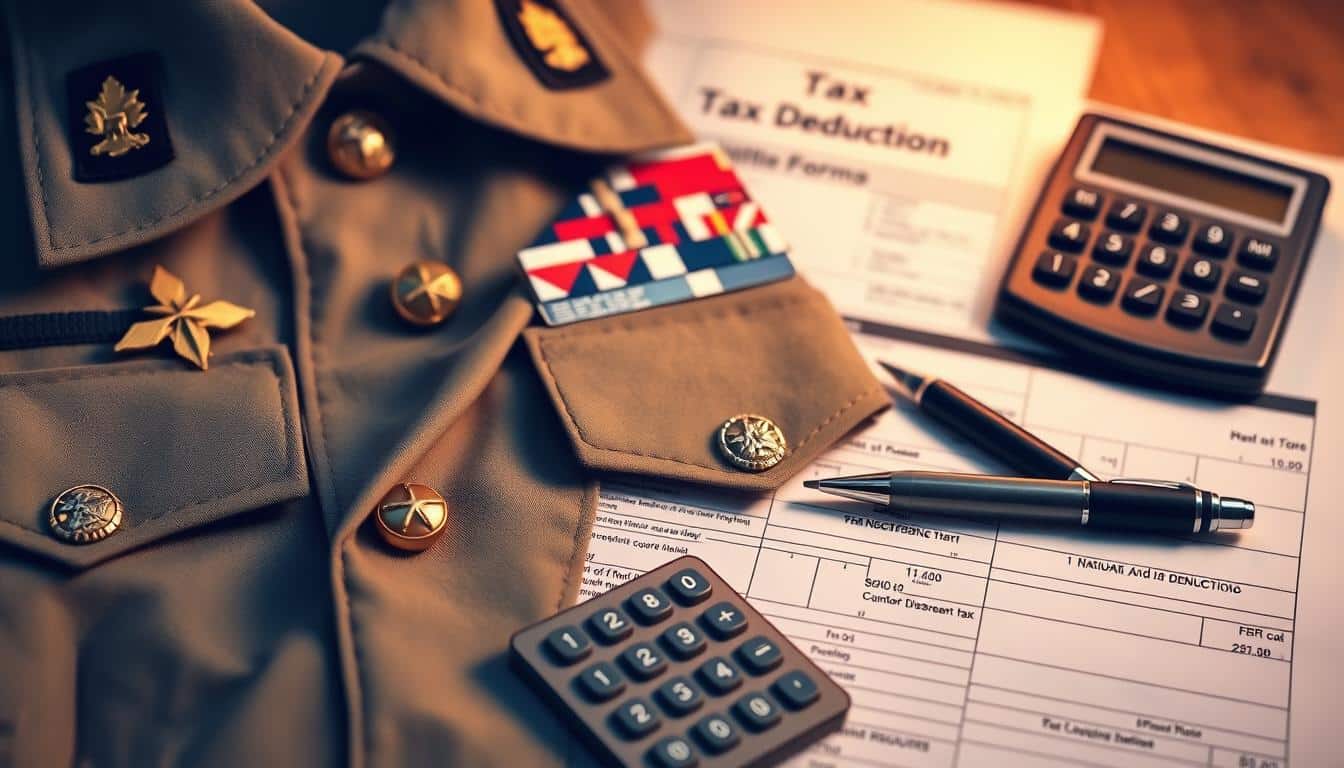Can you get back some of the money you spent on military uniforms? Yes, you can! But you need to know the rules about military uniform tax deductions. The IRS gives tax breaks to those in the military. This includes not taxing combat pay and giving tax breaks for housing and moving costs.
But, getting a uniform tax refund depends on IRS rules, your job’s policies, and the costs you have. It’s important to understand these rules to see if you can claim a refund.
Key Takeaways
- Some combat pay is tax-free for those serving in combat zones.
- Including nontaxable combat pay in taxable income could boost your earned income tax credit.
- Reserve and National Guard members may deduct travel expenses over 100 miles from home.
- MilTax offers free tax preparation and electronic filing software for military members.
- IRS Volunteer Income Tax Assistance provides free tax return preparation for eligible service members and veterans.
Understanding Tax Deductibility for Military Uniforms
Understanding tax benefits for military apparel can be tricky. It’s key for service members to know what qualifies for deductions. Exploring tax deductions for uniform expenses can lead to big savings for those in uniform.
What Qualifies as Deductible Military Uniform Expenses?
Your uniform must be only for official duties, not everyday wear. Uncle Sam has strict rules for what gets deductions. If your uniform is also for a night out, forget the deductions.
Your employer must require these uniforms, and they must follow strict rules. This ensures you can get military clothing tax deductions.
Employer’s Policies and Verification
Get ready for a lot of paperwork. Keep all your expense documents. This means saving every receipt like they’re secret files.
This careful record-keeping helps with verification. It’s key for getting tax benefits for military apparel.
Recording and Claiming Your Deductions
Are you ready for the IRS forms? You’ll need to list these expenses on Schedule A of your tax return. Only amounts over 2% of your adjusted gross income can be deducted.
If Uncle Sam or your employer pays you back, that part isn’t deductible. To claim these deductions, you need careful attention and lots of paperwork.
Are Military Uniforms Tax Deductible?
Exploring the rules for deducting military uniform costs can be complex. We’ll simplify the IRS guidelines, discuss exceptions for reimbursed expenses, and look at extra tax benefits for military members.
IRS Guidelines on Deducting Military Uniform Costs
The IRS has clear rules for deducting military uniform costs. You can claim a deduction if your uniform rules don’t let you wear it outside duty. It must also not be your everyday civilian clothes. Costs for buying special military gear like badges, shoulder boards, and ceremonial swords are deductible. So are the costs to keep them in good shape.
Remember to keep all receipts and records. They’re crucial for your tax return.
Exceptions for Reimbursed Expenses
Remember, any allowance or reimbursement for uniforms must be subtracted from your deduction. For example, if you get a yearly clothing allowance, that lowers what you can deduct. You can only deduct what you paid out of pocket that’s over what you got back.
So, it’s important to keep accurate records of both your expenses and reimbursements. This helps you get the most from your military uniform tax deduction.
Additional Related Tax Benefits for Military Personnel
There are more tax benefits for military members too. Combat pay might not be taxed if you’re in a combat zone. Reservists can deduct travel costs if they’re over 100 miles from home, using Form 2106.
There are also deductions for moving when you’re permanently stationed somewhere new, claimed with Form 3903. Plus, there are special exclusions for combat zones, help with tax prep on base, and deductions for job hunting when you’re leaving the military. Knowing about these can really help lower your taxes.
Understanding what you can deduct and the other tax benefits you’re eligible for is key. With good record-keeping and the right knowledge, military personnel can make the most of their tax returns.








